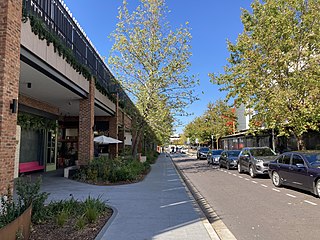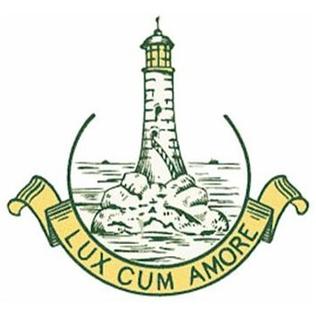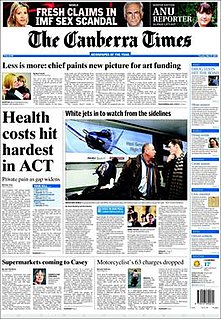
Canberra is the capital city of Australia. Founded following the federation of the colonies of Australia as the seat of government for the new nation, it is Australia's largest inland city and the eighth-largest city overall. Unusual among Australian cities, it is an entirely planned city. The city is located at the northern end of the Australian Capital Territory at the northern tip of the Australian Alps, the country's highest mountain range. As of June 2020, Canberra's estimated population was 431,380.

The University of Canberra (UC) is a public research university in Bruce, Canberra, Australian Capital Territory. The campus is within walking distance of Westfield Belconnen, and 8.7 km (5.4 mi) distance to Canberra's Civic Centre. UC offers undergraduate and postgraduate courses covering five faculties: Health, Art and Design, Business, Government and Law, Education and Science and Technology.

Gary John Joseph Humphries is a Deputy President of the Administrative Appeals Tribunal. He was a member of the Australian Senate representing the Australian Capital Territory for the Liberal Party of Australia from 2003 to 2013. He was the Chief Minister of the Australian Capital Territory from 2000 to 2001; and was elected to the first parliament of the Australian Capital Territory, in 1989, later representing the Molonglo electorate until 2003.

The District of Belconnen is one of the original eighteen districts of the Australian Capital Territory (ACT), used in land administration. The district is subdivided into 27 divisions (suburbs), sections and blocks. The district of Belconnen is largely composed of Canberra suburbs.

Civic is the city centre or central business district of Canberra. "Civic" is a common name for the district, but it is also called Civic Centre, City Centre, Canberra City and Canberra, and its official division name is City.

Deakin is a suburb of Canberra, Australian Capital Territory, Australia. Development began in the 1920s, although the vast majority of the suburb was built after 1945. It is a largely residential suburb. It includes the official residence of the Prime Minister, The Lodge, and the Royal Australian Mint.

The Division of Fenner is an Australian Electoral Division in the Australian Capital Territory and the Jervis Bay Territory. As of the 2018 redistribution, it includes Gungahlin and the part of Belconnen north of Belconnen Way and west of Eastern Valley Way, Aikman Drive and William Slim Drive. It also includes the Jervis Bay Territory.

Forrest is a suburb of Canberra, Australian Capital Territory, Australia. Forrest is named after Sir John Forrest, an explorer, legislator, federalist, premier of Western Australia, and one of the fathers of the Australian Constitution. Streets in Forrest are named after explorers and governors. According to the Australian Bureau of Statistics Forrest is the second most Socio-Economic advantaged location in Australia after the neighbouring suburb of Barton.

Lyneham is a suburb of Canberra, Australia in the North Canberra district. It is named after Sir William Lyne, premier of New South Wales from 1899 to 1901. The suburb name was gazetted in 1928, but development did not commence until 1958. The streets of Lyneham are named after artists and people associated with the development of early Canberra.

Florey is a residential suburb of the Belconnen district of Canberra, located within the Australian Capital Territory, Australia. Florey was gazetted on 5 August 1975 and most houses were constructed in the mid-1980s.
ACTION is a bus operator in Canberra, Australia owned by the ACT Government.

Woden Town Centre is the main commercial centre of the district of Woden Valley in Canberra, Australia. It is located in the Canberra suburb of Phillip. The town centre has a variety of shops and amenities, including office blocks that house Australian departments, and shopping centres like Westfield Woden. The Woden Valley itself was the first satellite city, separate from the Canberra Central district.

Dickson College is a public two-year secondary college located in the Canberra suburb of Dickson, Australian Capital Territory. It was established in 1976 on the former Dickson High School campus when it closed.

Scullin is a residential suburb in the Belconnen district of Canberra, located within the Australian Capital Territory, Australia. The suburb is named after Prime Minister of Australia James Henry Scullin. It was gazetted on 6 June 1968. In the city of Canberra, suburbs are assigned street names that reflect a distinct sub-group of cultural or historical Australian significance. The streets in the suburb of Scullin are named after aviators. Scullin is located adjacent to the suburbs of Higgins, Florey, Page and Hawker. Southern Cross Early Childhood School and Scullin neighbourhood oval are located within the suburb. It is bordered by Kingsford Smith Drive, Belconnen Way, Southern Cross Drive and Chewings Street. Scullin is approximately 20 minutes walk and 5 minutes by car from the Belconnen Town Centre and 15 minutes walk and 3 minutes by car from the Hawker Shopping Centre. It is approximately 10 to 15 minutes by car from Canberra City and 30 minutes from Canberra Airport.

Weetangera is a suburb in the Belconnen district of Canberra, located within the Australian Capital Territory, Australia. The suburb covers an area of approximately 158 hectares. Located approximately 10 kilometres (6.2 mi) north-west of the city, Weetangera is bounded by Springvale Drive to the south and west, Coulter Drive to the east and Belconnen Way to the north. The Pinnacle Nature Reserve, a Canberra Nature Park is adjacent to the south of the suburb, across Springvale Drive.

Ginninderra is the name of the former agricultural lands surrendered to urban development on the western and north-western fringes of Canberra, the capital of Australia. Ginninderra corresponds with the watershed of Ginninderra Creek, which is now in part occupied by the Canberra districts of Belconnen and Gungahlin.
University of Canberra Senior Secondary College Lake Ginninderra, formerly known as Lake Ginninderra College until 2011, is a public secondary college for students in Years 11 and 12. It is located in the Australian Capital Territory, Australia, situated on the lakefront of Lake Ginninderra.

Rangiora High School is a state co-educational secondary school located in Rangiora, New Zealand. Established in 1881 by an act of parliament and opened in 1884, the school has a roll of 1661 students from years 9 to 13 as of March 2021, making it the fifth-biggest school in the South Island.

The Canberra Times is a daily newspaper in Canberra, Australia, which is published by Australian Community Media. Founded in 1926, the newspaper converted from broadsheet to tabloid format in 1956.
Red Hill School is a government international primary school located in the suburb of Red Hill, in Canberra, Australia. It is the first government school in the Australian Capital Territory and New South Wales to implement the International Baccalaureate Primary Years Programme, having gained IBO membership in 2006.
















